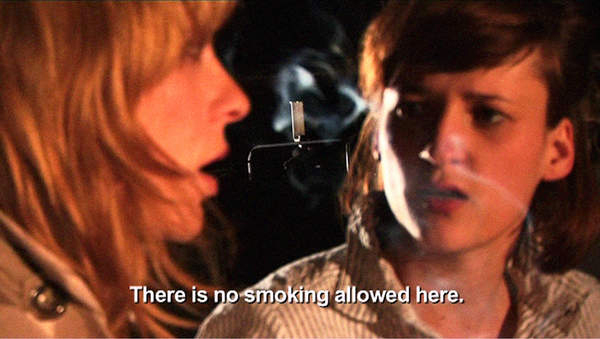Films experiment with the absurd

A still from Keren Cytter’s exhibit, which features experimental films inspired by the absurdist genre to explore different human relationships.
By Lauren Roberts
Jan. 10, 2010 9:31 p.m.
At just 32 years old, Israeli artist Keren Cytter’s portfolio is one of impressive proportions. With more than 50 video art works, three novels and a theatrical performance under her belt, she thrives on the creative process.
With a wide breadth of work ranging from traditional mediums of drawing and painting, to recent projects in writing and live performance art, museums such as London’s Tate Modern have featured Cytter’s work.
Though most notably a film artist, Cytter did not begin working with the medium until 2001 when she began working with a friend’s camera.
“I had always made drawings, but I wanted to do something else,” Cytter said. “Video art was something else.”
In what marks her West Coast debut, the Hammer’s Video Gallery features three of Cytter’s short films: “Les Ruissellements du Diable” (The Devil’s Streams, 2008), “Four Seasons” (2009) and her most recent work “Untitled” (2009), a film featured in the 2009 Venice Biennale festival.
The exhibition, which runs through April 4, is part of the Hammer Projects ““ an ongoing series featuring the works of emerging contemporary artists.
“I’d seen her work in a few places around the world but knew that she hadn’t shown on the West Coast before,” said Anne Ellegood, senior curator at the Hammer. “She was selected for her strong and unusual work. She’s always trying new things.”
Finding inspiration in such filmmakers as Roman Polanski, Alfred Hitchcock and Michelangelo Antonioni, and writers Tennessee Williams and Samuel Beckett, Cytter’s work adheres to an absurdist genre while portraying complicated human relationships.
“I want (the audience) to be confused,” she said. “There is an understanding without understanding details. It’s not like cinema.”
Using nonÂlinear narrative, language and narration, Cytter’s films mesh the familiar with the foreign, intertwining realism with fantasy. Scenes are interconnected or even repeated within the same film, while an outside narrator along with the characters themselves describe their thoughts and actions through voiceover.
While the films are shot on location with handheld cameras (often in Cytter’s own Berlin apartment), they create alternate environments and quick scene changes and cuts, contradictory to the heightened studio special effects of Hollywood.
“There’s an interesting realism combined with this obvious evidence of fabrication,” Ellegood said. “(“˜Four Seasons’ is) shot with non-professional actors in Keren’s apartment. It’s not a flashy set. It makes you aware of this tension of real people in real space, yet on the other hand it’s within this nonlinear, strange narrative.”
Though Cytter writes her scripts in English, her films are often translated into languages in which she is not fluent, making language an entirely stylistic choice.
“In “˜Les Ruissellements du Diable’ I used French. I find it to be exotic, but I wanted to not define it by language. That is why there is also Chinese music playing,” she said.
Linguistic and cultural dynamics are manipulated in conjunction with Cytter’s settings to create existential spaces that suspend reality while existing within its realms.
“I think she draws attention to filmmaking as an art,” said Ameet Chahall, a third-year history and film student. “Even though the genre is confusing, it shows what we usually take for granted in other films. We forget about basic traditional elements like language and narration.”
While unconventional in style, Cytter’s work offers experimental film not easily accessible in mainstream media.
“We’re used to the idea that people should be in a narrative,” Ellegood said. “But it’s interesting to have a film where we can see this quality that anything can happen.”


